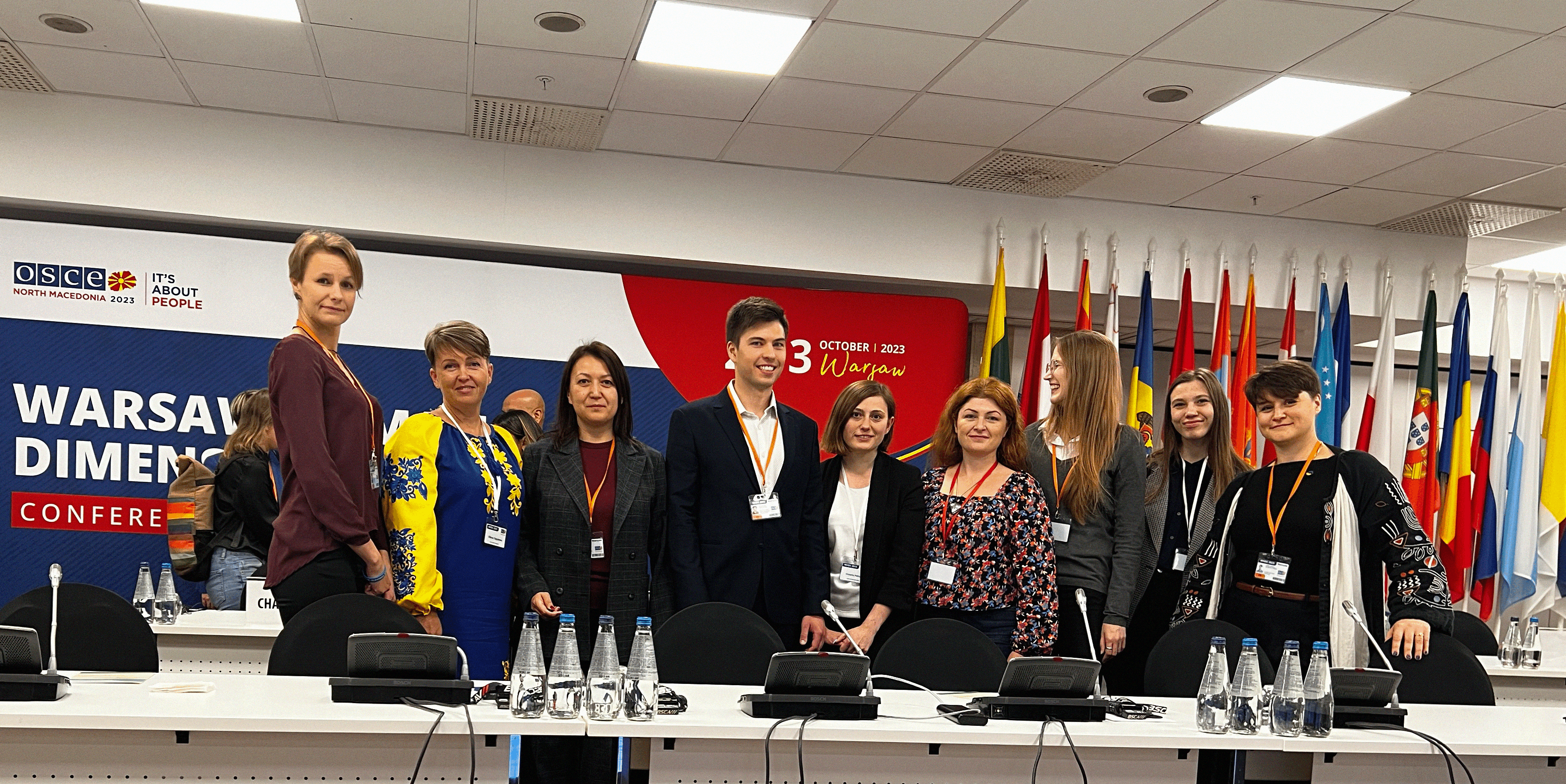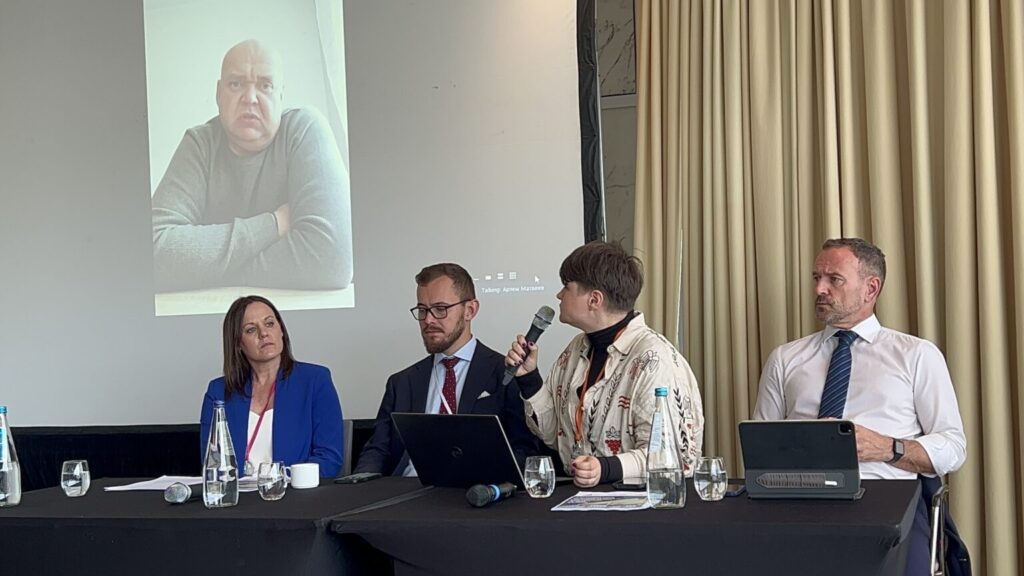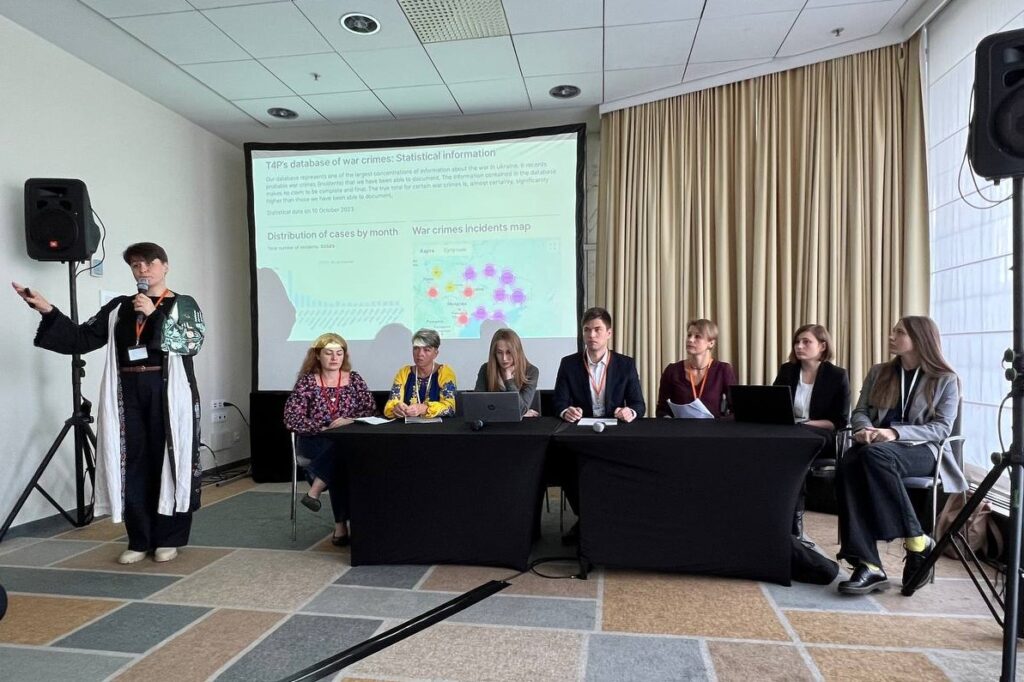The Center for Civil Liberties participated in the Warsaw Human Dimension Conference. They discussed filtration, forced displacement, prisoners of war, and their ill-treatment.

On October 9th and 10th, as part of the Warsaw Human Dimension Conference, representatives of the Center for Civil Liberties participated in two-panel discussions on the topics of “Filtration and Forced Displacement: Examining Violations of International Law by Russia” and “Torture of Civilian and Military Prisoners After Russia’s Invasion of Ukraine.”
Representatives from the Center for Civil Liberties who attended the event included the organization’s Executive Director, Oleksandra Romantsova, who served as the discussion moderator, Coordinator Sviatoslav Ruban, and Coordinator of National Projects Nataliia Yashchuk, who both acted as assistants.
On the first day of the event, discussions focused on the so-called “filtration” of Ukrainian civilians, which has increasingly become a matter of concern and attention. The event also featured a discussion of a new report titled “Russia’s War in Ukraine: Filtration and Forced Displacement of Civilians as Gross Violations of International Law,” authored by the American Bar Association Center for Human Rights, the Center for Civil Liberties, and the Free Russia Foundation.
This report compiles testimonies from those documenting the treatment of Ukrainian civilians and the conditions of their detention, as well as forced displacements and deportations associated with the filtration process. The report provides an overview and analysis of evidence collected regarding the practice of filtration based on field research conducted both in Ukraine and abroad. The primary focus of the analysis is on three categories of violations related to filtration: arbitrary detention and deprivation of liberty, inhumane treatment and torture, as well as forced displacement and deportation. These actions directly violate numerous international laws, encompassing three legal frameworks: international human rights law, international criminal law, and international humanitarian law.
“This report, which we presented, was done in collaboration with the American Bar Association Center for Human Rights and the Free Russia Foundation, which was established prior to Russia’s full-scale invasion to liberate Russia from the Putin regime. We have been working with them for over four years on political prisoners. The filtration process itself is not a war crime. However, it becomes a major war crime precisely because of how it takes place at the borders between the occupied territory and Russia due to the actions of Russia. There is violence and unlawful detention involved. One of the participants in our panel, a former prosecutor, spoke about the filtration situation, through which he spent over a year in various places of detention – first in the occupied Donetsk and Luhansk regions, then in Taganrog. He witnessed many cases of violations, including beatings and violent acts. As a prosecutor, he observed how these were unlawful and unregulated procedures that had no legal basis,” explains Oleksandra Romantsova.
Among the panelists for this session were Nataliia Arno, President of the Free Russia Foundation; Scott Martin, Managing Director of Global Justice Advisors and co-founder of Global Rights Compliance; Kristie Bluett, Assistant Professor of Clinical Law at the University of Cincinnati College of Law; Greg Frolov, Vice President of the Free Russia Foundation; and Christopher “Kip” Hale, Senior Expert of the Atrocity Crimes Advisory Group (ACA) in Ukraine. The moderator for the session was Oleksandra Romantsova, Executive Director of the Center for Civil Liberties.

The second day of the event was dedicated to the discussion of prisoners of war and their ill-treatment. Freedom from torture or other cruel, inhuman, or degrading treatment or punishment is a non-derogable right. Despite this absolute prohibition, Russian forces continued to systematically use torture and other forms of ill-treatment during the Russian invasion of Ukraine. Russia itself largely refuses to acknowledge that it is holding civilians, making them the most vulnerable category of prisoners.
“The goal of this panel is to demonstrate how violations of International Humanitarian Law occur within the filtration procedures. What are the reservations and reactions in the form of, for example, sanctions against those who carry out filtration or make decisions about them. In particular, the opening of a criminal case at both the national and international levels. But if we are talking about OSCE member states, to which we have turned for recommendations, the idea was to respond to this not only with legal but also with political statements and decisions. To draw attention to the fact that the environment of filtration procedures is a place where new illegally detained civilians, missing persons, and victims of torture and murder appear,” says the executive director of the Center for Civil Liberties.
The speakers for this day included Olena Kuvaieva, a human rights lawyer from the Strategic Litigation Center of the Ukrainian Helsinki Human Rights Union; Vladyslav Dolzhko, a legal consultant for the Kharkiv Human Rights Protection Group; Yuliia Poliekhina, a lawyer from the Human Rights Group “SICH”; Victoriia Petruk, an expert from the Coordination Headquarters for the Treatment of Prisoners of War; Anna Kozmenko, a lawyer specializing in strategic litigation from the Ukrainian Helsinki Human Rights Union; and Olena Yahupova, a Ukrainian civilian who was illegally detained by Russia. The moderator for this panel was also Oleksandra Romantsova, the Executive Director of the Center for Civil Liberties.


